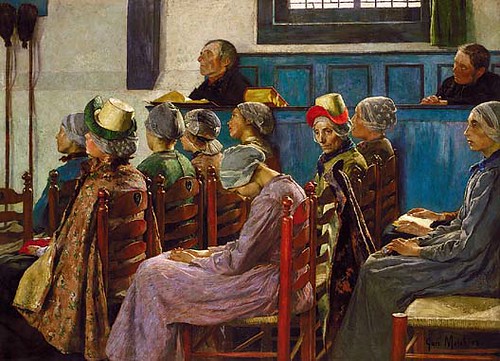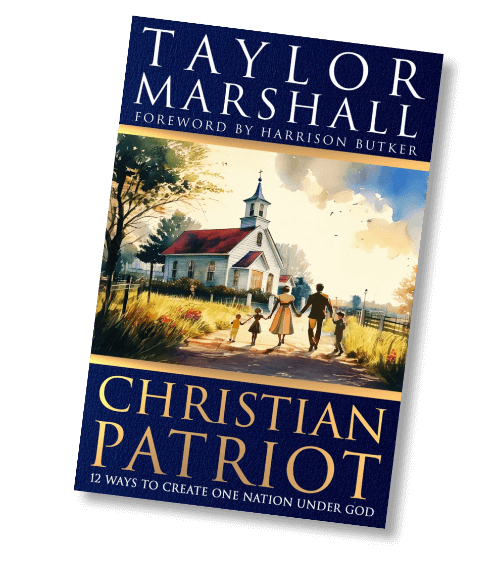The Catholic Church and Reformed Doctrine

A few Reformed folks have contacted me about the Catholic Perspective on the Federal Vision post. One gentleman (a fellow alumnus of Westminster Seminary Philly) seems ready to be reconciled with the Catholic Church, but he asks, “How do I square predestination with Catholic teaching?” That is a great question. I myself struggled with it. Let’s take a look at predestination and a couple of other issues that relate to Reformed objections to the Catholic Church.
Is the Catholic Church “Semi-Pelagian“?
First of all, despite what popular preachers say or what you’ve read in Tabletalk or Modern Reformation, the Catholic Church is not Pelagian or Semi-Pelagian. These heresies were formally condemned by episcopal councils of the Catholic Church. The term “Pelagian” is only known today because Catholic bishops assembled and anathematized the heresies. Pelagianism was defined and condemned by the Council of Carthage (418). The canons relating to this council are as follows:
1. Death did not come to Adam from a physical necessity, but through sin.
2. New-born children must be baptized on account of original sin.
3. Justifying grace not only avails for the forgiveness of past sins, but also gives assistance for the avoidance of future sins.
4. The grace of Christ not only discloses the knowledge of God’s commandments, but also imparts strength to will and execute them.
5. Without God’s grace it is not merely more difficult, but absolutely impossible to perform good works.
6. Not out of humility, but in truth must we confess ourselves to be sinners.
7. The saints refer the petition of the Our Father, “Forgive us our trespasses”, not only to others, but also to themselves.
8. The saints pronounce the same supplication not from mere humility, but from truthfulness.
(Note that Baptists are technically “Pelagian” because they reject canon #2.)
The Catechism of the Catholic Church rightly teaches that grace is wholly unmerited and received by grace alone:
The charity of Christ is the source in us of all our merits before God. Grace, by uniting us to Christ in active love, ensures the supernatural quality of our acts and consequently their merit before God and before men. The saints have always had a lively awareness that their merits were pure grace. (no. 2011)
The Catechism of the Catholic Church then goes on to quote one of the Doctors of the Catholic Church, St. Thérèse of Lisieux as an example of how this life of grace is supposed to be lived out and confessed by Catholic Christians:
“After earth’s exile, I hope to go and enjoy you in the fatherland, but I do not want to lay up merits for heaven. I want to work for your love alone. . . . In the evening of this life, I shall appear before you with empty hands, for I do not ask you, Lord, to count my works. All our justice is blemished in your eyes. I wish, then, to be clothed in your own justice and to receive from your love the eternal possession of yourself.” (St. Thérèse of Lisieux, “Act of Offering” in Story of a Soul.)
Did you see the part about “All our justice is blemished in your eyes”? That is official Catholic theology and devotion.
The 2nd Council of Orange (529) condemned “Semi-Pelagianism” and it is worth noting that Calvinists of today would deny at least one of its canons – especially Canon #13:
CANON 13. Concerning the restoration of free will. The freedom of will that was destroyed in the first man can be restored only by the grace of baptism, for what is lost can be returned only by the one who was able to give it. Hence the Truth itself declares: “So if the Son makes you free, you will be free indeed” (John 8:36).
In other words the theologians at the Council of Orange (529) used baptismal regeneration as the antidote to the Semi-Pelagian heresy. The great irony is the theologians of the Scottish and American Reformed tradition technically fall under the heading of “Semi-Pelagian” because they deny that baptism is the “sacrament of regeneration” – to use borrow a term use by St Augustine.
What about Predestination?
As to the doctrine of predestination, and more specifically, the doctrine of unconditional election, the Catholic is allowed to hold the doctrine of unconditional election – so long as he does not espouse the doctrine of double-predestination. All Thomists (Catholic theologians that favor St. Thomas Aquinas) believe and teach the doctrine of unconditional election.
St. Thomas Aquinas wrote the following:
“God wills to manifest his goodness in men: in respect to those whom he predestines, by means of his mercy, in sparing them; and in respect of others, whom he reprobates, by means of his justice, in punishing them. This is the reason why God elects some and rejects others…. Yet why he chooses some for glory and reprobates others has no reason except the divine will. Hence Augustine says, ‘Why he draws one, and another he draws not, seek not to judge, if thou dost not wish to err.'” (Summa Theologia I, 23, 5)
This is a clear exposition of unconditional election, and it is taught by the Church’s most celebrated theologian since St. Augustine.
What about sola fide and sola scriptura?
Justification through faith alone and the hermeneutic of Scripture as the sole authority for Christian doctrine are rightly identified as the sine qua non of the Protestant Reformation. Without sola fide and sola scriptura buttressing Protestantism, all roads lead to Rome, plain and simple. They are rightly identified as the material and formal causes of the magisterial Reformation.
It’s no secret that the Catholic Church unequivocally rejects these two doctrines as dangerous to the Christian soul and to the Church at large. The Catholic Church can appreciate what these two doctrines try to protect. “Faith alone” attempts to preserve the radically gracious nature of the Gospel, and this intention should be commended. “Scripture alone” seeks to protect the doctrine of Divine Revelation and protect the Church from the erroneous doctrines of men. Again, good intentions. The Catholic theologian Louis Bouyer discussed the “good intentions, bad doctrines” of the Reformation at length in his The Spirit and Forms of Protestantism – a book I highly recommend to anyone interested in the Reformation debate. Bouyer shows that the Protestant Reformers were speaking out against abuses, but unfortunately employed the nominalistic worldview available to them. There were not equiped to handle the nuances and made conclusions that ultimately undercut their project.
If this one-two punch of the Reformation (sola fide and sola scriptura) is so key, why doesn’t the Bible ever articulate these two doctrines? The words “faith” and “alone” only appear together once and that is in James 2:24 – “You see that a man is justified by works and not by faith alone.” Christ never proclaims the doctrine of justification by faith alone. St Paul speaks of the importance of justifying faith, but his just condemnation of “works” is always the “works of the law” – by which Paul means the “works of the Mosaic Torah,” a reference to circumcision, the lunar calendar of Israel, etc. If you’ve read the New Testament, you know that Christ and His Apostles did not once articulate “justification by faith alone.” It derives from Luther’s insertion of the word “alone” into his translation of Romans 3:28.
“Scripture alone” is self-refuting, because it too is not found in Scripture. There are some who will immediately want to quote both 2 Tim 3:116-17 and 2 Peter 3:15-16 as evidence for sola scriptura but neither passage teaches that Scripture alone is the final authority. “Scripture alone” is one the extra-biblical doctrines that hovers over the Reformed worldview.
Ultimately, the Reformed tradition attempted to reform the nominalist mess of the late 15th century-early 16th century into a Christ-centered, grace-centered system. In their eagerness to posit human salvation in the will and power of God, they neglected the fact that human salvation could only be accomplished in human time and space and that God’s eternal will included the ecclesial dimension of salvation. Like the incarnation, life, death, resurrection, and ascension of Christ, so the Church belongs as a tangible element of the history of redemption. Abstracting the Church is the same gnostic tendency used to abstract the incarnation or resurrection of our Lord the Christ. To put it another way, you can’t have Augustine’s soteriology without Augustine’s ecclesiology. Soteriology and ecclesiology should be happily married and not squabbling as with a divorce.
What to Watch Next
SHOP THE TAYLOR MARSHALL STORE
Dive Deeper

GET CONFIDENT IN YOUR FAITH
Explore the fascinating world of Catholic teachings with Dr. Marshall. Together you’ll unpack the brilliant answers the Church gives to tough questions about the Faith. The best part: you go at your own pace. Start this exciting journey today.


 >
>



